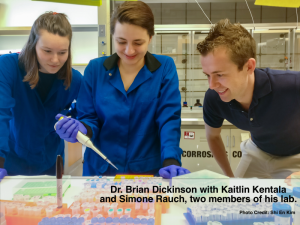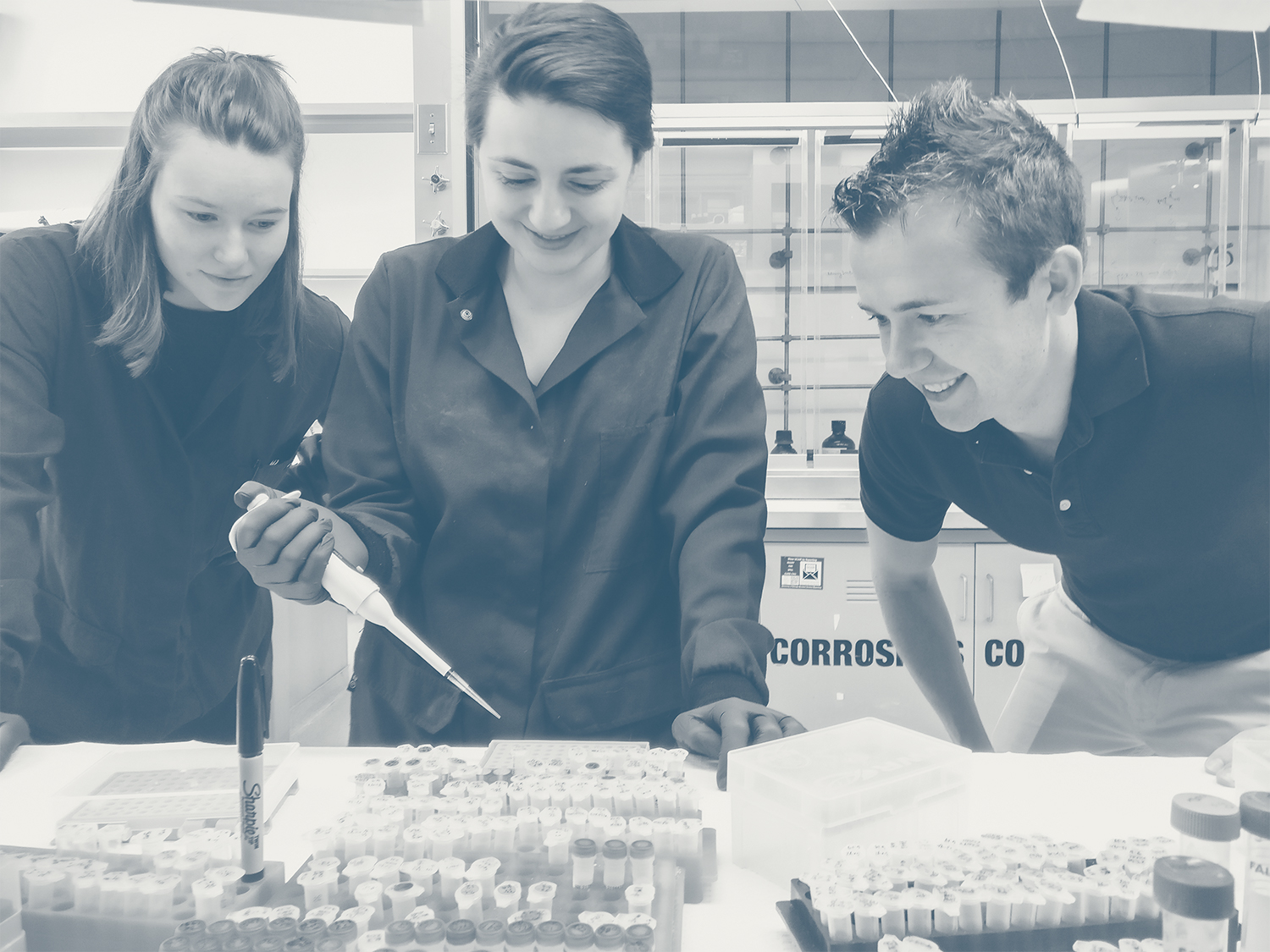The Cancer Research Foundation is pleased to congratulate our 2014 CRF Young Investigator
Dr. Bryan Dickinson, PhD on the development and publication of his CIRTS system.

CIRTS, or “CRISPR-Cas Inspired RNA Targeting System,” suggests a way to build on the success of CRISPR-Cas9, the landmark gene editing tool, and a way to address some of the limitations and issues inherent in using CRISPR-Cas.
CRISPR-Cas, first harnessed as a way to edit DNA in 2013, allows scientists to alter the genome directly, and has profoundly changed the possibilities in cancer research and in the development of potential therapies. Nevertheless, using CRISPR to change DNA has problematic attributes and some of these issues led to the development of CIRTS.
First, a quick (and very simplistic) lesson in how genes work. Your DNA contains genes which tell your cells what to do and how and when to do it. The way they convey this information is by providing a recipe for particular proteins – proteins are the things that really get stuff done in your body. The gene provides a recipe for a protein, but it requires an enzyme to read the recipe and make a copy of it to produce the protein. This recipe reader is RNA (RiboNucleic Acid,) which then goes out into the cytoplasm of a cell where RNA provides instructions for the protein being produced.
Gene editing with CRISPR-Cas works by pairing a piece of RNA that is targeted to a certain gene sequence in DNA with a Cas enzyme, which is pulled along with the aimed RNA and cuts the DNA at the targeted sequence. Then the cell recognizes the damage and will attempt to repair itself, creating an opportunity for scientists to manipulate the repair.
As mentioned, CRISPR-Cas is far from perfect as a tool. Altering someone’s DNA directly is problematic as a therapeutic method; changes to DNA cannot be easily reversed and unintended results are not easily mitigated. If a patient responded poorly to gene editing, it would be difficult to return his or her DNA to its prior state. Further, the Cas proteins used are relatively large, meaning that getting them into cells in order to function is a challenge. Finally, the Cas family of proteins are bacterial proteins, which can potentially create a negative immune response in a system just by being introduced.
These are some of the problems chemist Bryan Dickinson hopes to address with CIRTS, his new gene editing system. Rather than refine the editing of DNA itself, his tool edits RNA – the intermediate messengers in the process. Essentially, CIRTS can re-write the recipe for the creation of a protein as it leaves the DNA, rather than changing DNA itself. This RNA tool (or set of tools) uses new abilities to identify, draw together and alter RNA to allow researchers and potentially clinicians to change and affect the proteins your DNA makes at the source, without actually editing the DNA.
CIRTS provides a potential opportunity to make an end run around many of the issues inherent in the original CRISPR method. Because the RNA is only a copy of the recipe, a change to the RNA is not a permanent alteration, making the use of this method as a treatment for cancer (or any other disease or problem) reversible and thus much safer. Additionally, CIRTS is better suited to making changes to a whole suite of different RNAs, which means it might be a far more efficient way to attack diseases like cancer, where multiple genes can be involved. The RNA modifying proteins are also much smaller than the Cas proteins, which will allow for more fine-tuned targeting of the DNA effect a clinician or researcher might want to study or alter.
Finally, the RNA modifying protein platform that CIRTS is built on is not derived from bacterial proteins like the Cas proteins. Instead, it is engineered from human protein ingredients; this means it can avoid triggering an immune response in patients, a challenge when using the Cas family of proteins.
Clearly, this tool has implications that reach far beyond cancer. Dr. Dickinson’s work on the programmable RNA used in CIRTS has been published recently in the scientific journal Cell and he is currently seeking to collaborate on all types of health research-related problems where CIRTS might be helpful. Five years ago, when the Cancer Research Foundation funded Dr. Dickinson’s work as a Young Investigator, he was working on reprogramming human enzymes that could be used to attack cancer proteins. This work is directly related to the development of RNA proteins that can respond to particular biochemical signals and was important in the development of CIRTS. Today, Dr. Dickinson is working intimately with clinicians at the University of Chicago, including Dr. James LaBelle and Dr. David Rubin, both past CRF grantees, to bring his RNA technology directly into their cancer clinics.
Dr. Dickinson’s creativity, insight and success is a perfect example of why the Cancer Research Foundation’s brand of early stage investing in young investigators and novel ideas is so important and can be so effective. It is easy to imagine that a talented chemist like Bryan Dickinson might never have set his sights on cancer therapeutics. One of our jobs, as funders of cancer science, is to support promising early career scientists, often working in fields not directly linked to cancer like chemistry and computer science, to join the fight against cancer and bring all their best ideas and insights to bear in working to create more and better treatments, preventive measures, and cures for cancer. Fighting cancer by funding brilliant scientists and clinicians such as Dr. Dickinson, Dr. LaBelle and Dr. Rubin is what we do, and by supporting the Cancer Research Foundation, you help us support game-changing science like this every day.
